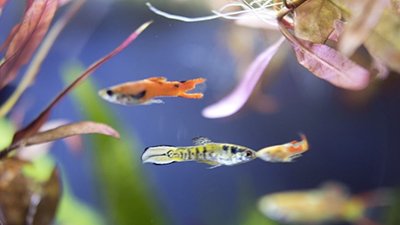
Island Evolves Lizards
Rapid evolution—“evolving in ways that would normally take millions of years to play out,” says National Geographic News. How does it confirm the Bible?
News Source
- National Geographic News: “Lizards Rapidly Evolve After Introduction to Island”
Five adult pairs of the Italian wall lizard were moved from one Croatian island to another in 1971 in an experiment now revealed to have “shocking” results, Kimberly Johnson writes.
The modern population of lizards all descended from the ten pioneers transplanted to the island almost 40 years ago.
“We didn’t know if we would find a lizard there. We had no idea if the original introductions were successful,” explained biologist Duncan Irschick of the University of Massachusetts–Amherst. Yet when the scientists returned to the island—far later than originally planned, partially due to years of warfare in the region—the island was “swarming with lizards.” Genetic tests confirm that the modern population of lizards all descended from the ten pioneers transplanted to the island almost 40 years ago.
Plenty of “evolution” has happened in the meantime, including:
- The island’s native population of lizards (which were healthy but less aggressive than the introduced lizards) has disappeared.
- The descendants of the introduced lizards have larger heads and, because of that, a stronger bite.
- The descendants of the introduced lizards have a “completely new gut structure.”
- The descendants of the introduced lizards have dropped some territorial defenses and live more densely because of plentiful food sources.
All of these transformations have taken place in approximately 30 lizard generations, astonishingly quick compared to the long evolutionary timeline many scientists adhere to. “That’s unparalleled. What’s most important is how fast this is,” Irschick explained.
The most intriguing discovery is the allegedly “completely new gut structure” of the lizards. According to the article, the original lizards were “not built to digest a vegetarian diet,” while the island they were transplanted to is filled with plants.
But the lizards today have developed cecal valves, which Johnson describes as “muscles between the large and small intestine . . . that slowed down food digestion in fermenting chambers, which allowed their bodies to process the vegetation’s cellulose into volatile fatty acids.” This “brand-new structure,” as Irschick calls it, allowed the lizards to digest plant material.
But Answers in Genesis anatomist David Menton, after reviewing the research, noted that the original lizards did have the ability to digest plant material; they simply preferred insects for roughly 95 percent of their dietary needs. (This is also in line with the Bible’s teaching that all animals were originally vegetarian—which would mean these lizards’ ancestors, at least, had the capability to digest plants, and that genetic information could exist latently in the modern lizards.)
Hendry wonders, as Menton suggests, if the change was simply the lizards’ “plastic response to the environment.”
Furthermore, Menton adds, “The ‘new’ muscular valve they found between the small and large intestine is simply an enlargement of muscles already present in the gut wall at this juncture.” In other words, far from being a truly new feature, the shift in available food allowed lizards with larger muscles at the juncture to be more successful at feeding and reproducing.
Menton also suggests that if the lizards were returned to their original habitat, the cecal valve feature may dwindle as the lizards returned to an insectivorous diet.
Apparently the researchers aren’t even sure about the genetic basis for the change, another suggestion that the “evolution” did not involve any new genetic information in the lizards. McGill University biologist Andrew Hendry noted, “All of this might be evolution. The logical next step would be to confirm the genetic basis for these changes” (emphasis added). Hendry wonders, as Menton suggests, if the change was simply the lizards’ “plastic response to the environment.”
Thus, once again, this so-called “evolution” is possibly just natural selection acting on pre-existing genetic information, helping a population adapt to its surroundings. However, without knowing the exact genetic or epigenetic mechanism(s) underlying the change, we can’t determine exactly what is going on, biologically speaking. (To read more about the possibilities, read “Life: Designed by God to Adapt.”)
More important (as Irschick said) is the speed of the changes, which reminds us of how quickly the original created kinds could have varied into the biodiversity we see today (interrupted by the Noachian Flood event).
Along similar lines, a recent study of guppy populations showed that when introduced into new habitats, the guppies “developed new and advantageous traits in just a few years.” In particular, the guppies’ reproductive strategies differed based on the presence of predators.
“The fact that fitness differences were found after only eight years shows just how fast evolution can work—for short-lived species anyway,” the press release on the study states. But once again, this rapid adaptation (which can lead to speciation) fits well within the creation model.
Further Reading
- Rapid Speciation
- Hasn’t Evolution Been Proven True?
- Lizards Losing Limbs Case For Evolution in Action
- Twitchy Lizards
- Get Answers: Information Theory, Natural Selection, Speciation
For More Information: Get Answers
Remember, if you see a news story that might merit some attention, let us know about it! (Note: if the story originates from the Associated Press, FOX News, MSNBC, the New York Times, or another major national media outlet, we will most likely have already heard about it.) And thanks to all of our readers who have submitted great news tips to us. If you didn’t catch all the latest News to Know, why not take a look to see what you’ve missed?
(Please note that links will take you directly to the source. Answers in Genesis is not responsible for content on the websites to which we refer. For more information, please see our Privacy Policy.)
Recommended Resources

Answers in Genesis is an apologetics ministry, dedicated to helping Christians defend their faith and proclaim the good news of Jesus Christ.
- Customer Service 800.778.3390
- Available Monday–Friday | 9 AM–5 PM ET
- © 2026 Answers in Genesis




